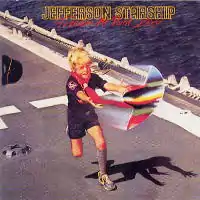Freedom at Point Zero
Freedom at Point Zero is the fifth album by Jefferson Starship and was released in 1979. It was the first album for new lead singer Mickey Thomas, and the first after both Grace Slick and Marty Balin left the previous year (Slick rejoined the band for their next album Modern Times in 1981 and Balin joined the revived Jefferson Starship in 1993). Aynsley Dunbar plays drums on this album; he had left Journey the previous year. The album cover was shot on location in the San Francisco Bay on board the USCGC Midgett.
| Freedom at Point Zero | ||||
|---|---|---|---|---|
 | ||||
| Studio album by | ||||
| Released | November 1979[1] | |||
| Recorded | 1979 at the Record Plant, Los Angeles and Sausalito | |||
| Genre | Rock, hard rock, arena rock, AOR | |||
| Length | 42:27 | |||
| Label | Grunt | |||
| Producer | Ron Nevison | |||
| Jefferson Starship chronology | ||||
| ||||
| Review scores | |
|---|---|
| Source | Rating |
| Allmusic | |
| Christgau's Record Guide | C−[3] |
The single "Jane" peaked on the Billboard Hot 100 at No. 14 and spent three weeks at No. 6 on the Cash Box Top 100.[4] "Jane" was featured in the 2009 video game Grand Theft Auto IV: The Lost and Damned, as well as the opening music to the film Wet Hot American Summer and its prequel series Wet Hot American Summer: First Day of Camp, while also being featured in the 2023 comedy thriller film Cocaine Bear. It is one of the few songs that was performed live by both the Paul Kantner-led Jefferson Starship TNG and the Mickey Thomas-led Starship. The song "Lightning Rose" predicts the concept of the Nuclear Furniture album, and in fact its character Lightning Rose would return on Nuclear Furniture as the key character in that album's concept.
Record World called the single "Girl with the Hungry Eyes" a "ferocious rocker."[5] It said of "Rock Music" that "Mickey Thomas' frenetic vocals rip over roaring guitars."[6]
Track listing
| No. | Title | Lyrics | Music | Length |
|---|---|---|---|---|
| 1. | "Jane" | David Freiberg, Jim McPherson | Freiberg, McPherson, Paul Kantner, Craig Chaquico | 4:07 |
| 2. | "Lightning Rose (Carry the Fire)" | Kantner | Kantner | 4:36 |
| 3. | "Things to Come" | Kantner, China Wing Kantner | Kantner | 4:49 |
| 4. | "Awakening" | Jeannette Sears | Pete Sears | 7:59 |
| 5. | "Girl with the Hungry Eyes" | Kantner | Kantner | 3:28 |
| 6. | "Just the Same" | Chaquico, J. Sears | Chaquico, Eric Van Soest | 5:17 |
| 7. | "Rock Music" | Chaquico, J. Sears | Chaquico | 3:35 |
| 8. | "Fading Lady Light" | J. Sears | P. Sears, Mark Unobsky | 3:39 |
| 9. | "Freedom at Point Zero (Climbing Tiger Mountain through the Sky)" | Kantner | Kantner | 4:25 |
Personnel
- Mickey Thomas – lead (1, 3-9) and backing vocals
- Paul Kantner – lead (2, 9) and backing vocals, rhythm guitar, keyboards (3)
- Craig Chaquico – lead guitar, rhythm guitar
- David Freiberg – bass (1, 2, 4, 6, 8) synthesizer (3, 5, 7, 9), backing vocals
- Pete Sears – bass (3, 4 (intro), 5, 7, 9), piano (1, 2, 4), electric piano (6), organ (8), rhythm guitar (8), backing vocals
- Aynsley Dunbar – drums, percussion
Additional personnel
- Steven Schuster – saxophone (1-3, 6, 9)
- Tower of Power – horns (1)
Production
- Ron Nevison – producer for Gadget Productions, Inc., engineer
- Michael Clink – engineer
- Mike Reese – mastering
- Pat Ieraci (Maurice) – production coordinator
- Paul Dowell – amp consultant
- Ria Lewerke-Shapiro – art direction, design
- Gary Regester – photography
- Tyrone Q. Thompson – star scout
- Bill Thompson – manager
- Recorded and mixed at The Record Plant, Los Angeles - Sausalito
- Mastered at The Mastering Lab, Hollywood
Charts
| Chart (1979-1980) | Peak position |
|---|---|
| Australian albums (Kent Music Report)[7] | 75 |
| Canada Top Albums/CDs (RPM)[8] | 20 |
| New Zealand Albums (RMNZ)[9] | 23 |
| UK Albums (OCC)[10] | 22 |
| US Billboard 200[11] | 10 |
Certifications
| Region | Certification | Certified units/sales |
|---|---|---|
| Canada (Music Canada)[12] | Platinum | 100,000^ |
| United States (RIAA)[13] | Gold | 500,000^ |
|
^ Shipments figures based on certification alone. | ||
References
- Strong, Martin Charles (1995). The Great Rock Discography. p. 430. ISBN 9780862415419.
- William Ruhlmann. "Freedom at Point Zero". Allmusic. Archived from the original on February 26, 2020. Retrieved April 5, 2020.
- Christgau, Robert (1981). "Consumer Guide '70s: J". Christgau's Record Guide: Rock Albums of the Seventies. Ticknor & Fields. ISBN 089919026X. Retrieved February 27, 2019 – via robertchristgau.com.
- "Top 100 1980-01-12". Cashbox Magazine. Archived from the original on 2012-09-13. Retrieved 2012-04-14.
- "Hits of the Week" (PDF). Record World. March 1, 1980. p. 1. Retrieved 2023-02-19.
- "Single Picks" (PDF). Record World. May 3, 1980. p. 16. Retrieved 2023-02-20.
- Kent, David (1993). Australian Chart Book 1970–1992 (illustrated ed.). St Ives, N.S.W.: Australian Chart Book. p. 154. ISBN 0-646-11917-6.
- "Top RPM Albums: Issue 9467a". RPM. Library and Archives Canada. Retrieved 25 June 2023.
- "Charts.nz – Jefferson Starship – Freedom at Point Zero". Hung Medien. Retrieved 25 June 2023.
- "Jefferson Starship | Artist | Official Charts". UK Albums Chart. Retrieved 25 June 2023.
- "Jefferson Starship Chart History (Billboard 200)". Billboard. Retrieved 25 June 2023.
- "Canadian album certifications – Starship – Freedom at Point Zero". Music Canada.
- "American album certifications – Jefferson Starship – Freedom at Point Zero". Recording Industry Association of America.